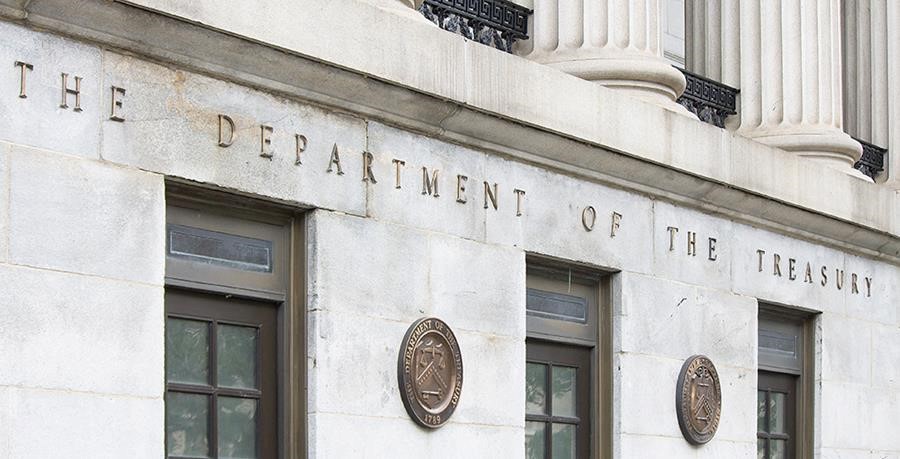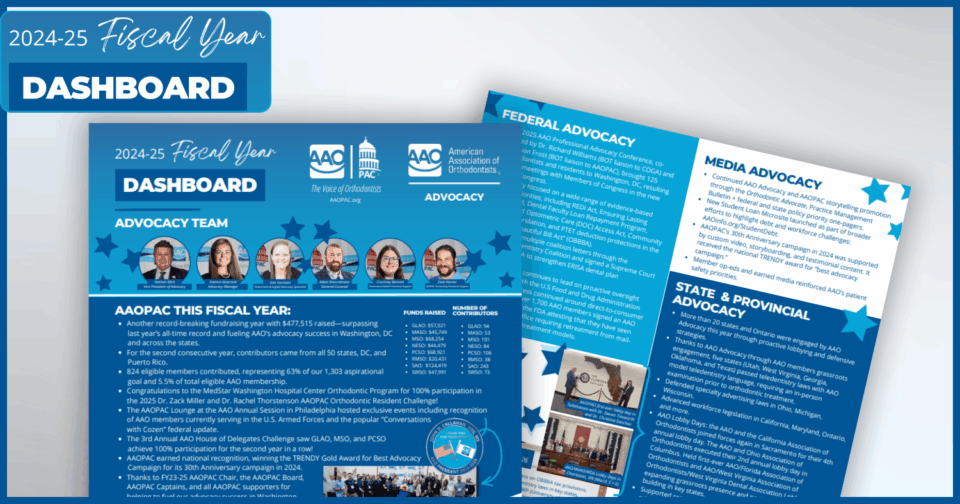The Corporate Transparency Act (“CTA”), a new federal law, aims to prevent money laundering, illicit financial activities, corrupt practices, and terrorist financing.
The law includes a new requirement for businesses to disclose to the government personal information and photographs of persons with ownership and control over their business’ operating in the United States. The requirement will apply to many orthodontic practices (see specifics below).
Information must be reported to the Beneficial Ownership Secure System (“BOSS”). The system is part of the Financial Crimes Enforcement Network (FinCEN), a bureau of the U.S. Department of the Treasury. Once the initial report is filed, this information must be updated within 30 days of any event that makes the previously reported information inaccurate or incomplete, such as an associate becoming a partner in the practice, or an owner name change upon marriage.
Noncompliance with the CTA can result in significant fines, as well as jail time (for willful violations). To avoid penalties, filing is required this year:
● Businesses that existed before January 1, 2024 must file by January 1, 2025;
● Businesses created after January 1, 2024 must file within 90 days of creation or registration;
● Businesses that are exempt from the CTA do not need to file (parameters for exemption are discussed below along with entity types that must file).
Corporate Transparency Act Q&A
● What is beneficial ownership? A beneficial owner is an individual who, directly or indirectly, owns or controls 25% or more of the ownership interests of the business. An individual can also be a beneficial owner if they exercise substantial control over the business.
Beneficial ownership does not include anyone who is solely an employee of the business or whose economic benefit comes from their employment status. The term also does not apply to a creditor, intermediary, or agent acting on behalf of another individual.
● Which business entity types are required to file? Entity types included in the filing requirement are corporations, business trusts, limited partnerships, limited liability companies, and cooperative associations.
● Which businesses are exempt? The CTA does not apply to companies that meet all of the following criteria:
▪ Operate from a physical address in the U.S.’
▪ Have 21 or more full-time employees (independent contractors and leased employees are not counted);
▪ Generate more than $5 million in annual U.S. gross receipts as reported on the previous year’s federal tax.
A business that is a sole proprietorship or a general partnership is also not required to file. In addition, there is currently an injunction against enforcement of the CTA against any business that was a member of the National Small Business Association as of March 1, 2024.
● How can I register? Registration can be completed at the link below. Click “Get Started” under the heading “Beneficial Ownership Information (BOI) Reporting.”
● What information must be provided? Information gathered includes the beneficial owner’s full legal name, date of birth, and residential street address. The registration also requires submission of a photo ID which could be a non-expired passport or driver’s license. Information about the business is collected as well, including the full legal name of the reporting company, any trade name or “doing business as” name of the reporting company, tax identification number, jurisdiction of formation, and street address.
● What happens to my information after I submit it? All of the collected information is maintained by the Secretary of the Treasury in a secure, nonpublic database which is not subject to Freedom of Information Act requests. The Secretary of the Treasury is obligated to take all steps to ensure the information is kept at the highest security level and is only accessed by government authorities for authorized purposes consistent with the goals of the CTA.
Each registered entity receives a FinCEN ID (Financial Crimes Enforcement Network Identification). Your FinCEN ID should be saved and used for when it becomes necessary to update the registration in the future.
● When should I update my registration? Registration should be updated when there is a change in beneficial ownership. The reporting business must update their registration within 30 calendar days of the change. An update can be filed at the same link above.
● What are the penalties for failing to file if my business is non-exempt? Penalties max out at $500 per day that the beneficial owner is in violation of the CTA. A person may also receive a maximum of $10,000 in fines and imprisonment of not more than 2 years.
The Secretary of the Treasury will conduct reviews of exempt entities in order to determine if businesses are improperly claiming to be exempt from the CTA.
● Are there other legal considerations? Additionally, because the information disclosed to BOSS is accessible by state and federal agencies, dentist-owned businesses must ensure that the information disclosed to BOSS does not conflict with (and therefore create a risk of enforcement under) other statutes with which dentist-owned businesses must comply. Examples include corporate practice of dentistry and licensing statutes or government health care program disclosure requirements for participating providers.
Learn More
Links for more information include:
NOTE: The U.S. District Court for the Northern District of Alabama ruled that the law is unconstitutional in a March 2024 decision. The case is now on appeal before the U.S. Court of Appeals for the Eleventh Circuit.



